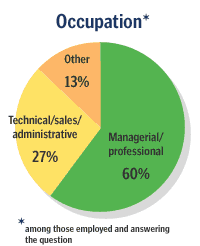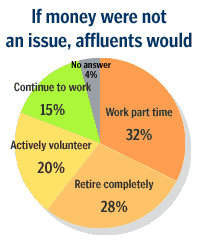NEW YORK (Money Magazine) - After a year in which Americans endured a terrorist attack, layoffs, a stock market swoon and news of billion-dollar corporate swindles, we wanted to gauge the mood of affluent Americans. Are they worried? What, if anything, are they changing about their financial lives? How much is enough to feel rich? What do they think their chances are of becoming wealthy? What's the best way to do it? What does affluence mean to them, anyway?
Working with RoperASW, a leading national polling firm, Money magazine surveyed affluent Americans with household incomes of $75,000 a year or more. We zeroed in on the affluent -- those who earn enough to be in the top 24 percent of American households -- because they are role models for success.
Not coincidentally, they resemble typical MONEY Magazine readers. They live in sight of the good life -- a goal of most Americans and a fantasy for much of the rest of the world. We sent questionnaires to a nationally representative sample and tabulated 1,767 responses from the financial and/or investment decision makers in their households. We wanted to know who affluent Americans are -- how much education they have, what careers they choose, what investments they own, even whether they think more about sex or money.
Finally, using a technique called cluster analysis, RoperASW identified six distinctive money personalities, each with their own values, desires and emotional styles as well as hopes and fears.
What money really means
When we gave our survey takers a selection of adjectives to describe themselves, a few stood out: independent (65 percent), well-organized (55 percent), goal-oriented (54 percent), confident (53 percent). Affluents consider themselves information junkies, interested in both the big picture (54 percent) and details (50 percent).
Yet they're not possessed by the pursuit of wealth. The vast majority -- 70 percent -- believe that the purpose of work is to pay for their other interests, and 63 percent contend that their success is an outgrowth of their inner happiness. Only 34 percent say that they are happy because they are successful. (This is one of the many ways that affluent Americans prove themselves to be well grounded. Psychological and sociological research has shown that once basic needs are met, money has a very low correlation with happiness. Even the joy you'd feel if you won the lottery would last only a few months.)
 |
|
| From Money/RoperASW survey of American financial and/or investment decision makers in households making at least $75,000. |
But that purported lack of attachment to money doesn't mean that the affluent are blind to its power. Seventy-seven percent acknowledge that having more money means having fewer problems, and 59 percent like being able to pay others to do tasks they don't have the time or desire to do themselves.
Over the years money has interviewed thousands of men and women who -- like this year's respondents -- reside at the top of America's income pyramid. We have found that these people rarely consider themselves affluent, and certainly not wealthy. "Middle-income" or, at best, "comfortable" are the two most common labels we hear. Those who responded to this survey say it takes a household income (for a family of four) of at least $61,100 to be considered middle income, $118,000 to be affluent and $250,000 to be rich. In terms of assets, the magic number soars to $2 million before affluents start feeling wealthy.
According to Dr. Gary Buffone, director of the Family Business Center in Jacksonville, Fla., his clients prefer the term comfortable, even when their assets approach $10 million. "These people are primarily self-made and they can't identify with being rich. They retain the middle-class values and lifestyle they grew up with, and even though they've accumulated millions, most live well below their means. If you've grown up in the middle class, that's who you are, even when you become wealthy."
| Money poll: Affluent Americans
|

|
| Among those who answered:
|
|
|
| • | Average Age: 47 (Most between 35 and 54)
|
|
|
|
| • | Family: Most married with children
|
|
|
|
| • | Two-income households: 74 percent
|
|
|
|
| • | Millionaires: 19 percent
|
|
|
|
| • | Jobs: 83 percent work. Of those 60 percent are professionals or managers.
|
|
|
|
| • | At least $250,000 net worth: 74 percent
|
|
|
|
|
Our affluent Americans are realists, a descriptor not offered in our survey. "To be affluent, you need to be able to buy most of the things you want, take a vacation once or twice a year and still save," explains Edward Wolff, an economics professor at New York University. "You also need a cushion of assets to protect you from hard times. In most of suburban America, an affluent family with two kids would require an income of at least $100,000 a year and assets of $1 million." Only 15 percent of our survey respondents meet this standard, which is mighty high.
Of course, a lifestyle that includes most of the things we want is profoundly richer than that of, say, 10 years ago. Our houses are bigger, we own more technical gadgets, we eat out more often and we're more likely to travel around the globe. In a world where most people don't eat three meals a day, it seems almost absurd to suggest that the word wealthy does not apply.
 |
|
| From Money/RoperASW survey of American financial and/or investment decision makers in households making at least $75,000. |
"One thing the '90s did was make extreme affluence seem almost normal," observes Alice M. Rivlin, senior fellow at the Brookings Institution. "People are recovering from the excesses of the boom. That's apparent in the controversy over executive compensation. I don't think the public reaction would have come unless the tech crash and the stock market downturn had preceded it. Excesses were also manifested in the boom in luxury housing. People suddenly believed they needed an enormous amount of space. Now people are struggling to regain a sense of what is normal in a very different time."
Nearly six in 10 respondents concur that the economic boom of the '90s changed the lifestyle of the average American family -- and not altogether for the better. Among those who feel that the economic boom had a lasting effect, 57 percent claim that it encouraged average Americans to live beyond their means, and 25 percent believe that the boom years made us all more anxious about how we're doing financially. We may have more stuff, but we're paying for it.
A taste for luxury, at a price
Although affluent Americans often describe themselves as conservative, many are early adopters when it comes to consumer products. Almost all have cell phones, and 83 percent own computers. One in four own a large-screen or flat-panel TV, and one in five own a home theater. They buy digital cameras (34 percent) and professional kitchen appliances (17 percent). But they don't kid themselves about the fact that these products are luxuries. Only 53 percent of laptop owners, for example, call them a necessity.

|
Affluents love to travel -- a vacation is their most popular splurge. The second choice: redecorating. That's understandable, considering how attached affluents are to their homes. But affluent Americans won't blow their money on any old status symbol. Although 78 percent admit that they'll pay extra to get what they want and 73 percent will pay more for convenience, they say price is the most important factor they weigh when they're shopping. Eight out of 10 admit that they enjoy their purchases more if they get a bargain.
Sex and money
Okay, we already know that most affluent Americans are married, so we can drop the sex stuff now, right? Wrong. Although 37 percent claim they think about money more than sex, 42 percent admit they enjoy sex more than money. Interesting note: The more educated and satisfied they are with their current financial situation, the more likely they are to say they think about sex vs. money.

|
Gender affects money in other ways too. Despite the fact that most affluent homes have two working spouses, the responsibility for money management continues to fall along fairly traditional lines, with wives more likely to pay the bills and husbands more likely to manage investments. But a substantial portion of affluent American couples now say they share responsibility for both tasks: managing investments (44 percent) and paying bills (25 percent). And the good news is that most affluent Americans trust their spouses when it comes to money. Although a substantial portion of these households (44 percent) maintain some separate accounts, only 9 percent of these folks keep stashes their beloveds don't know about -- unless they're not telling us either.

|

